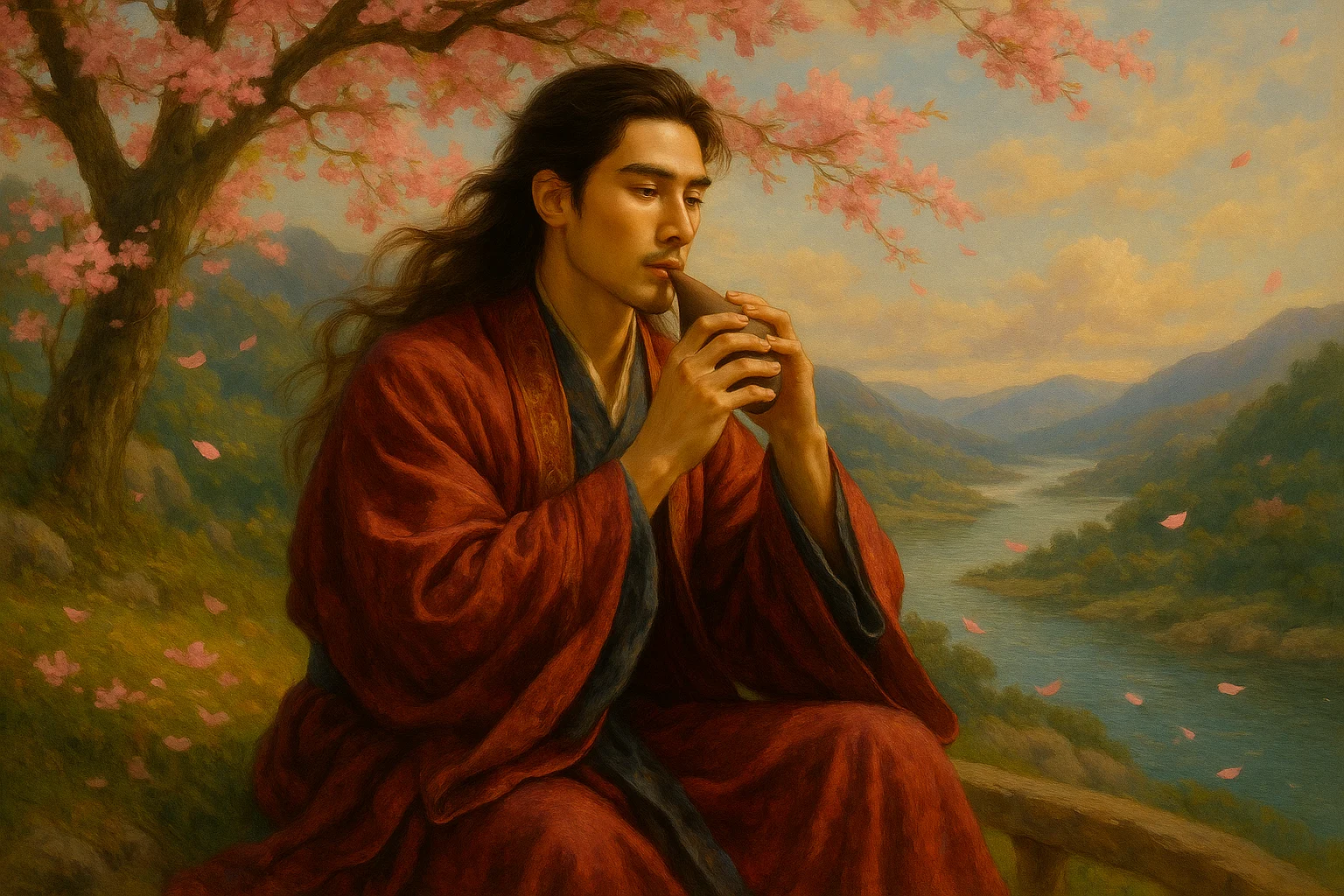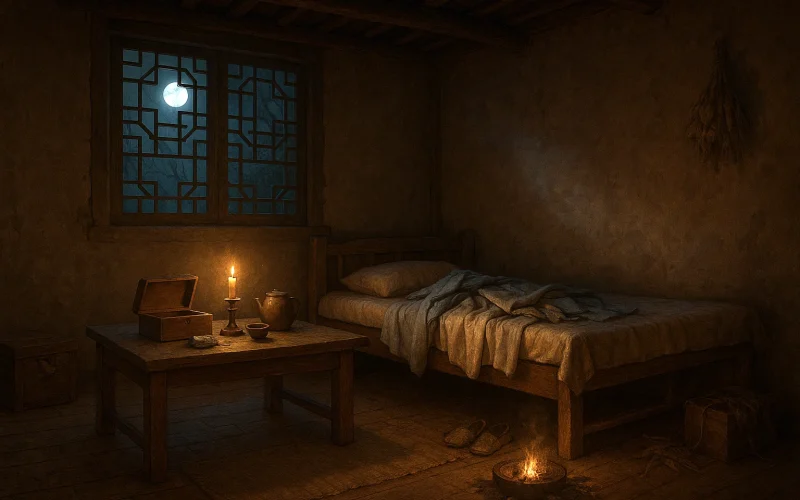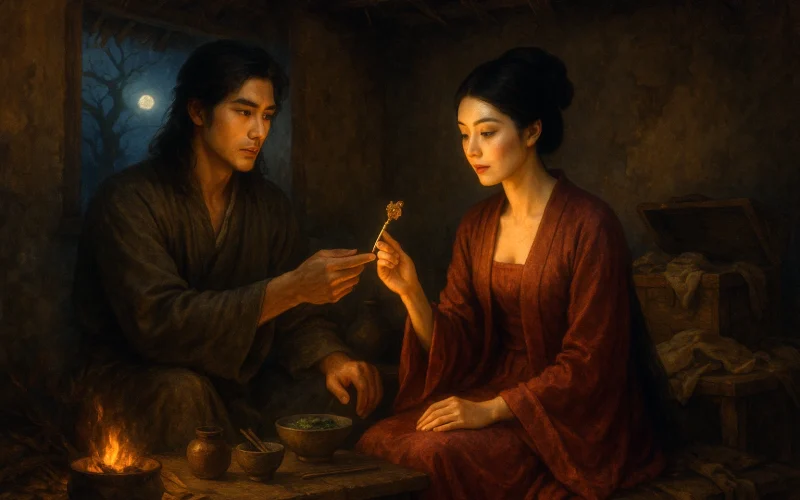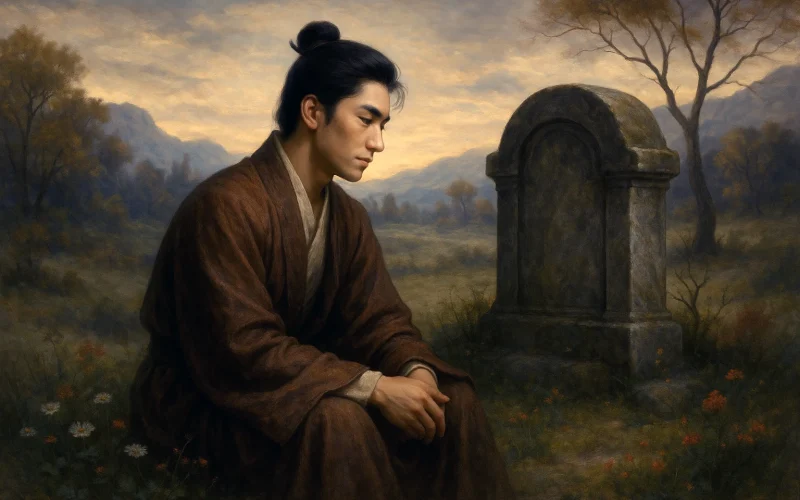We joked, long ago, about one of us dying,
But suddenly, before my eyes, you are gone.
Almost all your clothes have been given away;
Your needlework is sealed, I dare not look at it...
I continue your bounty to our men and our maids --
Sometimes, in a dream, I bring you gifts.
...This is a sorrow that all mankind must know --
But not as those know it who have been poor together.
Original Poem
「遣悲怀 · 其二」
元稹
昔日戏言身后事,今朝都到眼前来。
衣裳已施行看尽,针线犹存未忍开。
尚想旧情怜婢仆,也曾因梦送钱财。
诚知此恨人人有,贫贱夫妻百事哀。
Interpretation
"An elegy" was composed by Yuan Zhen about a year after his wife Wei Cong's passing, during his service as Imperial Censor. Continuing the elegiac tone of the first poem, this work delves deeper into the poet's profound longing and daily sorrows through recollections and artifacts left by his departed wife. Centering on the shared hardships of their impoverished marriage and the ultimate separation by death, it poignantly expresses the poet's solitude and boundless grief.
First Couplet: « 昔日戏言身后事,今朝都到眼前来。 »
Xīrì xì yán shēn hòu shì, jīnzhāo dōu dào yǎnqián lái.
Those playful talks we had about life after death— Now every word materializes before my eyes.
These lines reflect on past lighthearted discussions about mortality, now tragically realized. The poet laments life's impermanence and the inevitability of his wife's departure, intensifying his anguish.
Second Couplet: « 衣裳已施行看尽,针线犹存未忍开。 »
Yīshang yǐ shī xíng kàn jìn, zhēnxiàn yóu cún wèi rěn kāi.
Your clothes nearly all given away, yet Your sewing box stays untouched—I can't bear to open it.
The handling of his wife's belongings reveals inner conflict: donating her garments suggests acceptance, while preserving her sewing kit betrays lingering attachment. This dichotomy illustrates his enduring heartache.
Third Couplet: « 尚想旧情怜婢仆,也曾因梦送钱财。 »
Shàng xiǎng jiù qíng lián bìpú, yě céng yīn mèng sòng qiáncái.
Remembering your kindness, I treat our servants gently; Once, dreaming of you, I even sent spirit money.
Here, grief manifests in tender acts: kindness to servants mirroring his wife's compassion, and the irrational yet touching gesture of offering funeral money in a dream—a testament to his unyielding devotion.
Fourth Couplet: « 诚知此恨人人有,贫贱夫妻百事哀。 »
Chéng zhī cǐ hèn rénrén yǒu, pínjiàn fūqī bǎi shì āi.
I know this grief visits all mortals, yet For poor couples who shared every hardship, parting cuts deeper.
The closing couplet universalizes loss while underscoring its unique sharpness for those who endured poverty together. Their shared struggles make the final separation profoundly more tragic.
Holistic Appreciation
"Lamenting the Departed: Second of Three" continues the themes of its predecessor, expressing the poet's profound longing and sorrow for his late wife. Through descriptions of his wife's belongings, dream sequences, and deep emotional outpourings, the poem reveals Yuan Zhen's anguish after losing his spouse. In reminiscing about the past, the poet reflects both on his wife's noble origins and their shared experiences of poverty. With delicate brushstrokes, Yuan Zhen captures his wife's devotion to their family, the depth of their mutual affection, and the inconsolable grief that follows her passing.
The poem's language is simple yet deeply moving. Particularly in handling his wife's belongings, the contradictory acts of "giving away" and "preserving" convey his profound nostalgia. The seemingly absurd act of "sending money in a dream" lays bare the poet's attachment to his departed wife, intensifying the sense of loneliness and yearning for their past life together.
Artistic Merits
This poem's artistry lies in its use of plain language to express profound emotions. Through everyday details and tangible objects—clothing, sewing kits, servants—Yuan Zhen materializes his longing, making it vivid and poignant. Furthermore, the irrational act in his dream and the contradictions in his behavior underscore how inseparable their bond remains. In simple yet potent language, the poem conveys personal suffering and endless remembrance, showcasing the poet's unique artistic style.
Insights
The poem profoundly reflects the depth and pain of marital love. Through his intense nostalgia, the poet articulates the complex emotions surrounding love, loss, life, and death. Readers may sense both the preciousness and fragility of human connections, as well as the resilience of love through hardship. This is not merely Yuan Zhen's personal grief but a universal resonance for all who have lost loved ones—a reminder to cherish those we hold dear, for beyond wealth or poverty, love remains what matters most.
Poem translator
Kiang Kanghu
About the poet

Yuan Zhen (元稹), 779 - 831 A.D., was a native of Luoyang, Henan Province, who was poor in his early years, but later became an official and finally died of a violent illness. He was friendly with Bai Juyi and often sang with him, and was known as “Yuan Bai”.












